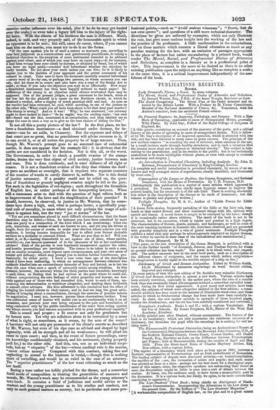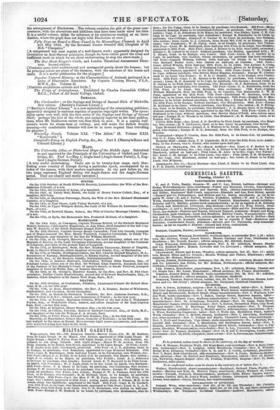*PUBLICATIONS RECEIVED.
Boons.
Lady Granard's Nieces; a Novel. In three volumes. The Moral, Social, and Professional Duties of Aitornies and Solicitors. By Samuel Warren, Esq., F.R.S., of the Inner Temple, Barrister-at-Law. The Jesuit Conspiracy. The Secret Plan of the Order detected and re- vealed by the Abbate Leone. With a Preface by M. Victor Considerant, Member of the National Assembly of France, &c. Translated, with the Author's sanction, from the authentic French edition.
On Femoral Rupture; its Anatomy, Pathology, and Surgery. With a New Mode of Operating, applicable to cases of Strangulated Hernia generally.. With Plates. By John Gay, Fellow of the Royal College of Surgeons of England, &c. [A thin quarto, containing an account of the anatomy of the parts, and a critical history of the modes of operating in cases of strangulated hernia. This is follow-
ed by Mr. Gay's description of an improved operation, which is attended with less
risk, and has been followed in many cases by great success. The principle of the new method consists " in reaching the seat of stricture, when external to the sac, by a small incision made through healthy structures, and in such a situation that the hernial mass shall not be injured or disturbed thereby." The subject is inte- resting to the practitioner, and in its results to the public; but is too technically anatomical to be made intelligible without plates, or even with except to students in anatomy and surgery.]
An Introduction to Practical Chemistry, including Analysis. By John E. Bowman, Demonstrator of Chemistry in King's College, London. [A complete and useful introduction to practical chemistry, by means of an ex- tensive and well-arranged series of experiments, clearly described, and illustrated by wood-cuts.]
Consumption of the Lungs, or Decline; the Causes, Symptoms, and Rational Treatment, with the Means of Prevention. By T. H. Yeoman, M.D. [Substantially this publication is a reprint of some articles which appeared in a periodical. Dr. Yeoman relies chiefly upon hygienic means to improve the general health, but his treatment is of the safe kind. There is nothing absolutely new either in the description of the dise.se or its mode of treatment; but the volume is plainly and popularly written.]
Twilight Thoughts. By M. S. C., Author of "Little Poems for Little People."
[A dozen little stories, frequently partaking of the fable or the fairy tale, inas- much as they endow flowers and other inanimate things with life, animals with
speech and reason. A moral lesson is sought to be conveyed by the tales; though it is occasionally rather above children. The merit of the book is not in its structure, but in its execution, which is tender and poetical in a high degree.
The characteristics of flowers, plants, animals, and landscapes, as well as some of the most touching incidents in domestic life, have been observed, and are presented with graceful simplicity and in a vein of genial sentiment. Twilight Thoughts exhibits a mind that may perhaps be advantageously employed on higher themes, if the writer be careful to steer clear of the lackadaisical and unsubstantial.]
The Ocean Monarch. By M. M.
[This poem, on the late destruction of the Ocean Monarch, is published with a view to the farther benefit "of Jeremiah, Jerome, and Thomas Sayers, for whom
no special collection has been made." The poem is in blank verse, and respect- able. The author succeeds best in the more level parts, such as a description of the different classes of emigrants, and the causes which induce emigration— his imagination is hardly equal to the terrible subject of a ship on fire.] Dictionary of Greek and Roman Antiquities. Edited by William Smith, LL.D. Illustrated by numerous engravings on wood. Second edition, improved and enlarged. [In some points of view this new edition of Dr. Smith's very valuable Dictionary of Greek and Roman Antiquities is almost a new work. Various articles have been entirely rewritten, especially in the earlier part, where the idea of a smaller book than was eventually found advantageous induced a somewhat curtailed treat- ment, during its first serial appearance. A good many new articles have been added, the subjects of which were altogether omitted in the first edition; a consi-
derable addition has been made to the number of illustrative wood-cuts; and those articles in which no fundamental change has been made have been carefully re- vised. In short, the new matter extends to upwards of three hundred pages, besides the illustrations; and the old has been carefully considered and corrected.] Xenophon's Anabasis. Books I. and II.; with a copious Vocabulary. For the Use of Schools. By James Ferguson, M.D., Rector of the West End
Academy, Aberdeen. '
[A boldly printed text after Dindorf, without commentary. The feature of the book is its vocabulary; which not only supersedes the cumbrous necessity of a dictionary, but furnishes the pupil with the meanings he is seeking for and no- thing more.] The Hammersmith Protestant Discussion; being an Authenticated Report of the Controversial Discussion between the Reverend John Cumming, D.D., of the Scottish National Church, Crown Court, Covent Garden, and Daniel French, Esq., Barrister-at-Law, on the Difference between Protestantism and Popery; held at Hammersmith, during the months of April and May 1839. From the Short-hand Notes of Charles Maybary Archer, Eeq„ New edition, with a copious Index. [The reprint of a discussion which took place so long ago as 1889, between a Scottish representative of Protestantism and an Irish embodiment of Romanism. The leading subject:: of dispute were discussed seriatim,—as transubstantiation, the sacrifice of the mass, the invocation of saints and angels; and each orator was allowed an hour at a time: perhaps not the best mode for a theological argu- ment of this nature, since, the respective speakers not exhausting their theme at once, the disquisition might be liable to pass into a sort of debate between the orators. At times, too, the audience seem to have borne a monosyllabic part in the discussion. It is a curious book, but likely, we opine, to be more curious than convincing to opponents.] The Law-Students' First Book ; being chiefly an Abridgment of Black- stone's Commentaries. Incorporating the Alterations in the Law down to the present time. By the Editors of "The Law-Students' Magazine." [A workmanlike compendium of English law, on the plan and to a great extent
the arrangement of Blackstone. The volume contains the pith of the great com- mentator, with the alterations and additions that have been made since his time. It is a useful volume, either for reference or for continuous reading as an intro- duction, where the pupil does not begin with Blackstone at once.]
Fifty Days on Board a Slave-Vessel in the Mozambique Channel, in April and May 1843. By the Reverend Pascoe Greaten Hill, Chaplain of H. MS. "Cleopatra."
LA compressed but neat reprint of a well-known work; apparently designed for circulation on Anti-Slavery principles, though its facts rather prove the cruel and inefficient mode in which we set about endeavouring to stop the slave-trade.]
The Box-Book-Keeper's Guide, and London Theatrical Amusement Direc-
tory. Second edition.
Contains some brief architectural and managerial gossip about the houses; but its principal points are plans of the theatres, with the numbers of the boxes and stalls. It is a useful publication for the playgoer.] Popular Natural History; or the Characteristics of Animals portrayed in a series of Illustrative Anecdotes. By Captain Thomas Brown, F.L.S., &c. Volume IL
[Contains amphibious animals and birds.]
The Frogs of Aristophanes. Translated by Charles Cavendish Clifford B.C.L , Fellow of All Souls' College, Oxford.
SERIALS.
The Clockmaker ; or the Sayings and Doings of Samuel Slick of Slickville. New edition. (Bentley's Cabinet Library.) [" Bentley's Cabinet Library " is a new undertaking of the enterprising publisher, apparently designed to embrace reprints of popular copyright works. The specu- lation opens very well, with the first series of the Sayings and Doings of Samuel Slick; perhaps the best of the whole, and certainly superior to the later publica- tions, when bfr. Haliburton rather ran Sam Slick to seed. It is a capital half- crown's worth for steam-boat or railway, and will make the dullest fireside amusing-for comfortable firesides will now be in more request than travelling for pleasure.] Waverley Novels. Volume XXI. "The Abbot." H. Volume XXIL "Kenilworth.' L Campbell's Essay on English Poetry, &c., &c. Part I. (Murray's Home and Colonial Library.)
MAPS.
The University Atlas, or Historical Maps of the Middle Ages. Submitted to and approved by the Principals of the Universities of Oxford and Cam- bridge, &cc. Part L-Map 1, Engla-land (Anglo-Saxon Period); 2, Eng- land (Anglo-Norman Period). [A very useful undertaking. There are to be twenty-four maps, each illus- trating some country of Europe during a particular epoch, accompanied by an index of the names, with their modern eqtuvalents. In the part before us, the two maps represent England during the Anglo-Saxon and the Anglo-Norman period. They are clearly and neatly executed.]



























 Previous page
Previous page